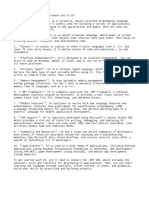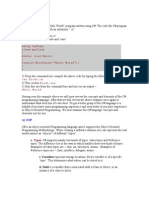0% found this document useful (0 votes)
13 views4 pagesCSharp Detailed Notes
C# is an object-oriented programming language developed by Microsoft that runs on the .NET framework, used for various applications including web and desktop apps. Key concepts include basic syntax, data types, control statements, object-oriented programming principles, and exception handling. Additional topics cover file handling, collections, LINQ, delegates, events, and useful tools for development.
Uploaded by
rakesh3103krCopyright
© © All Rights Reserved
We take content rights seriously. If you suspect this is your content, claim it here.
Available Formats
Download as PDF, TXT or read online on Scribd
0% found this document useful (0 votes)
13 views4 pagesCSharp Detailed Notes
C# is an object-oriented programming language developed by Microsoft that runs on the .NET framework, used for various applications including web and desktop apps. Key concepts include basic syntax, data types, control statements, object-oriented programming principles, and exception handling. Additional topics cover file handling, collections, LINQ, delegates, events, and useful tools for development.
Uploaded by
rakesh3103krCopyright
© © All Rights Reserved
We take content rights seriously. If you suspect this is your content, claim it here.
Available Formats
Download as PDF, TXT or read online on Scribd
/ 4
























































